
COMESA convened a bilateral meeting between the Governments of Zambia and Malawi aimed at discussing implementation of the Simplified Trade Regime (STR) including additional items to be placed on the common list of products.
Other issues discussed included the value threshold for STR and the complexities of some regulatory procedures such as sanitary and phyto-sanitary measures and systematic recording of STR transactions which are important for the regime to work efficiently.
The meeting was held on 13th April 2023 at Chansolo Lodge in Chipata, Zambia.
Speaking during the meeting, Director in the Ministry of Trade and Industry from Malawi Ms. Charity Musonzo said the meeting was held to thoroughly scrutinize the STR so that it reflects the aspirations of small-scale cross border traders.
Ms. Musonzo noted that, although the STR between Malawi and Zambia was aimed at benefitting cross border traders, there are several challenges that have been recorded while implementing the regime.
These include having few Trade Information Desk Officers (TIDOs) to support cross border traders, increased cost of doing business because priority is given to big traders with large consignments of goods and bureaucratic procedures in obtaining necessary documentation such as import and export permits, phytosanitary certificates, health veterinary certificates. The meeting heard that the fact that there are no updates of the Common list of products poses another challenge.
“The objectives of the COMESA STR are to reduce the cost of doing business for small scale cross border traders, but there are so many impediments to this that is why we are here to iron out these problems,” Ms Musonzo said.
The Zambian government noted that since its establishment, the STR was a convenient procedure which offers small scale traders’ quick facilitation. It however needs to be improved to smoothen operations.
Director Foreign Trade at the Ministry of Commerce, Trade and Industry, Mrs Bessie Chelemu, noted that apart from providing an enabling environment for small scale cross border traders to benefit from the tariff preferences, the STR has the ingredients to stimulate domestic production and cross-border trade.
European Union Development Fund (EDF11) programme manager at the Secretariat Mshuka Kamwela stated that COMESA looks forward to have the STR operational at all common border posts so that small scale cross border traders could enjoy the full benefits of duty and quota free entry of their goods.
“Simplifying and formalizing cross-border trade will help to empower marginalized population groups and make it easier for them to conduct business, earn incomes and also improve their livelihoods and those of their families, she said adding that, “we therefore view the STR as an instrument to help our governments to empower women and the youth,”.

